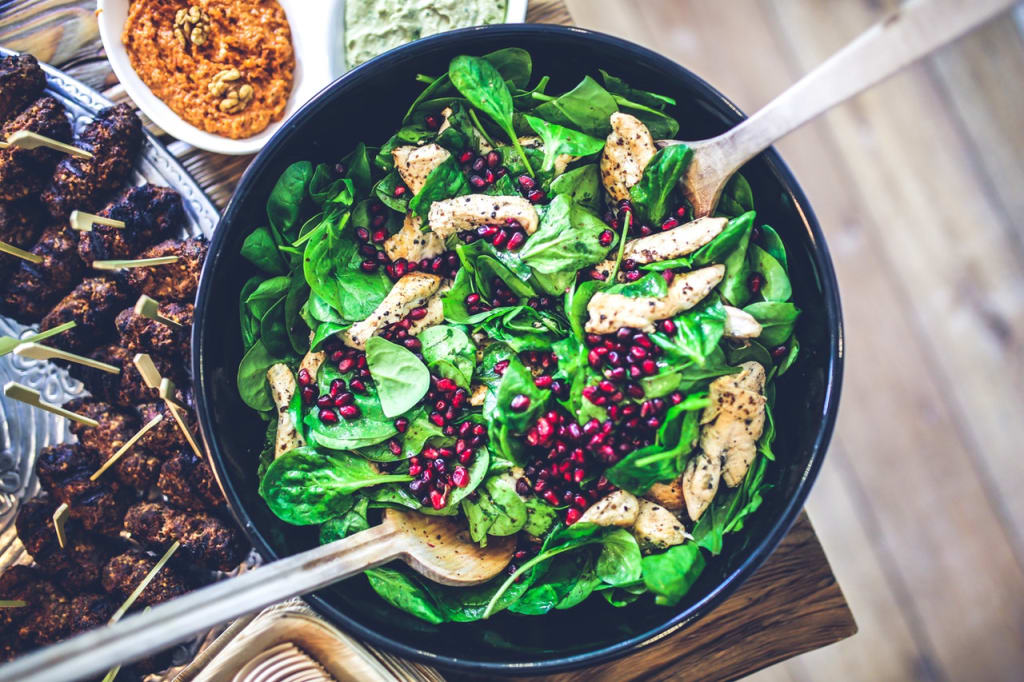Top Foods for Height Increase

Height increase food introdution
Height increase food, having good height is something many people desire, especially during the growing years. While genetics play a big role in determining your final height, certain foods can help support and maximize your growth potential. Here are 10 of the top foods that can boost height growth:
Milk
Milk is an excellent source of calcium and vitamin D – two nutrients that are vital for building strong, dense bones during childhood and the teenage years. Calcium is the key structural mineral found in bones and is needed for bone growth and development.
Milk is also a complete protein containing all 9 essential amino acids that aid growth. Drinking 2-3 glasses of milk daily can provide the calcium and proteins needed to help increase height.
Eggs
Eggs are packed with high-quality protein needed for muscle growth and development. The protein found in eggs provides the building blocks for bone cartilage and tissues that contribute to height growth.
Eggs also provide vitamin D, phosphorus, and vitamin B2 – nutrients that help strengthen bones. eating 1-2 eggs daily can boost protein intake to maximize growth.
Yogurt
Yogurt is an excellent source of calcium and vitamin D for bone health. It also contains probiotics that improve gut health and boost the absorption of key nutrients that regulate growth, like calcium, magnesium and phosphorus.
Including yogurt in your diet provides a tasty way to get bone-building nutrients like calcium. Choose plain yogurt and add fresh fruit for extra nutrients.
Soybeans
Soybeans are a plant-based source of complete protein ideal for vegans and vegetarians. Eating soybeans helps meet protein needs to support growth. Soybeans also provide calcium, vitamin D and vitamin K which play key roles in bone health.
Enjoy soybeans by adding them to soups, salads or rice dishes. Soy milk and tofu are also good options.
Salmon
Salmon is one of the best natural sources of vitamin D and omega-3 fatty acids like DHA which are important for height growth. Vitamin D helps with calcium absorption for healthy bones while DHA supports brain development.
Aim for 2-3 servings of salmon per week. Bake, grill or poach salmon fillets for a nutritious dinner rich in vitamin D.
Sweet Potatoes
Sweet potatoes are packed with vitamin A, vitamin C, potassium, calcium and iron – all nutrients that are essential for development and reaching your height potential. Vitamin A is especially important as deficiency during childhood can stunt growth.
Enjoy baked sweet potatoes as a nutritious side dish to boost your intake of growth-boosting nutrients.
Beans
Beans like kidney, pinto and black beans are plant-based protein sources rich in lysine, an essential amino acid for growth and development. Beans also provide key nutrients like iron, zinc and folate.
Add beans to salads, tacos, pasta dishes and soups for a delicious way to get growth-promoting nutrients from plants.
Chicken
Lean chicken breast is an excellent source of high-quality protein needed for muscle growth and development during the growing years. Chicken provides all 9 essential amino acids making it a complete protein food.
Chicken is also rich in niacin, zinc, vitamins A, B6 and B12 – nutrients that support cell division and DNA synthesis needed for growth.
Nuts and seeds
Nuts and seeds provide plant-based proteins and healthy fats that help boost height. Almonds, walnuts, pumpkin seeds and flaxseeds offer nutrients like zinc, magnesium and vitamin E for growth and bone health.
Add nuts and seeds to cereals, yogurt, salads or blends to increase protein, zinc, magnesium and vitamin E intake.
Leafy Greens
Leafy green vegetables like spinach and kale provide calcium, vitamins C, D and K for growing bones. They are also rich sources of folate which is a B vitamin that aids cell division and growth.
Add leafy greens to omelets, sandwiches, wraps and smoothies to boost intake of calcium and folate.
The Best Nutrients for Promoting Height Growth
Achieving your maximum possible height depends on getting adequate nutrients that support growth during childhood and adolescence. Here are some of the key vitamins, minerals and other compounds that influence height development:
Calcium
Calcium is the most important mineral for healthy bone growth and development. It is the primary component of bone tissue and teeth. Getting sufficient calcium allows for optimal bone mass to develop which determines final height.
Food sources: milk, yogurt, cheese, leafy greens, broccoli
Vitamin D
Vitamin D improves absorption and utilization of calcium for strong bones. Deficiency during childhood can impair bone mineralization resulting in rickets and distorted bones which affects height.
Food sources: salmon, egg yolks, fortified milk
Protein
Adequate protein intake provides the amino acids needed to build muscle, tissues, organs, cartilage and bone during the growing years. Lack of protein can limit growth potential.
Food sources: chicken, eggs, fish, beans, nuts
Zinc
Zinc is vital for growth as it enables cell division, DNA and protein synthesis needed for muscle and bone growth. Deficiency can result in slowed or stunted growth.
Food sources: meats, seafood, nuts, seeds, legumes
Vitamin C
Vitamin C plays a role in producing collagen needed for formation of cartilage and bone. It also aids iron absorption which supports growth and development.
Food sources: citrus fruits, berries, tomatoes, broccoli
Iron
Iron supports oxygen delivery in the blood and energy production. Iron deficiency can result in lowered metabolism and decreased growth.
Food sources: meat, eggs, spinach, nuts, beans
Incorporating foods rich in these vitamins, minerals and nutrients can help maximize your height potential during the growing years.
Incorporating These Foods into Your Diet Can Help You Grow Taller
The foods you eat provide the vitamins, minerals, proteins, amino acids and other compounds needed to reach your maximum height. Here are some practical tips for getting more growth-promoting foods into your daily diet:
- Drink 2-3 glasses of milk daily to increase calcium and vitamin D intake needed for bone growth. Choose low-fat or nonfat milk.
- Eat yogurt and cheese for added dairy-based calcium and probiotics to support bone health.
- Add eggs to your breakfast rotation to increase intake of proteins, vitamin D, vitamin B12 and other nutrients.
- Include salmon or sardines 2-3 times per week for vitamin D, omega-3s and proteins.
- Snack on nuts, seeds and nut butters to get plant-based proteins, zinc, magnesium and vitamins.
- Eat leafy greens at lunch and dinner for a boost of calcium, folate and carotenoids.
- Add beans, lentils and tofu to complement proteins from animal sources for growth.
- Enjoy citrus fruits, berries and tomatoes for vitamin C to support bone collagen formation.
- Choose whole grain breads, cereals and pastas for B vitamins that assist with cell growth and division.
- Stay hydrated with water which aids growth by allowing nutrients to be utilized effectively.
Making small substitutions like swapping soda for milk or adding spinach to a sandwich can make a difference. Developing optimal eating habits with growth-promoting foods will provide the best nutritional support to reach your height potential.
Height Boosting Foods You Should Be Eating Every Day
Making certain foods part of your daily diet is key to getting the consistent intake of nutrients needed to maximize height growth. Here are some of the top foods to eat daily:
Milk
Drinking milk daily provides the calcium, vitamin D, phosphorus and protein required for proper bone development during growth spurts. Choose low-fat milk and aim for 2-3 servings per day.
Eggs
Eating eggs daily supplies quality protein containing all 9 essential amino acids for growth. Eggs also provide vitamin D, B vitamins, zinc and iron to meet micronutrient needs.
Yogurt
Having yogurt each day is an easy way to increase calcium, vitamin D and probiotics. Choose plain yogurt and boost nutrition by topping with fruit, nuts or seeds.
Leafy Greens
Incorporate leafy greens like spinach, kale or romaine lettuce into your diet daily for nutrients like calcium, iron, folate and vitamin K. Add to omelets, sandwiches or smoothies.
Salmon
Eat salmon a few times per week for healthy omega-3 fatty acids including DHA which supports brain development. Salmon is also one of the best food sources of vitamin D.
Beans
Getting a serving of beans or lentils each day provides plant-based proteins and nutrients like iron, zinc and folate to complement animal protein sources.
Making simple substitutions like trading fruit juice for a glass of milk or adding spinach to your sandwich can help provide a daily dose of height-boosting nutrition. Consistency is key to reach your maximum height potential.
The Surprising Link Between Nutrition and Height
Most people understand that genetics play a major role in determining height, but fewer realize just how much diet can influence growth potential. The nutrients acquired from foods provide the building blocks that allow us to reach our full height. Here’s more on the link between nutrition and height:
- Calcium and vitamin D from dairy foods are crucial for bone development and growth. Deficiency in childhood can severely impact height potential.
- Adequate protein intake provides the amino acids required for building new tissues and muscles to reach optimal height.
- Key micronutrients like zinc, folate and iron support growth by enabling cell division, DNA synthesis and proper metabolism.
- Essential fatty acids assist with bone growth, brain development and hormone balance which influence growth.
- Overall calories provide the energy needed for the increased metabolism and cell activity associated with growth spurts.
- Water supports growth by allowing nutrients to be properly transported and used throughout the body.
The complex cascade of biological processes involved in growth and development require the nutritional building blocks obtained through diet to proceed normally. Without adequate nutrition, it’s impossible to achieve full genetic height potential.
How Certain Foods Can Affect Your Height Potential
While the right foods can help maximize your height, there are certain foods that can hinder growth if consumed in excess. Here are some of the biggest foods and nutrients to limit for optimal height development:
Sugary Foods and Beverages
Excess sugar can displace nutrient-rich foods in the diet and negatively impact growth. Sugary sodas like colas have been linked to lower bone mineral density in youth which can affect height.
Caffeine
High caffeine intake from coffee, energy drinks or tea can interfere with absorption of bone-building minerals like calcium. Limit caffeine foods and beverages to avoid potential effects on bone health.
Alcohol
Drinking alcohol, especially in large amounts, while bones are still growing can disrupt optimal bone mass development and limit height potential. Avoid underage drinking.
Salty Foods
Eating a diet high in table salt may increase calcium excretion through urine and reduce bone mineral density over time. Limit salty snacks like chips, pretzels and crackers.
Phytic Acid
Foods high in phytic acid like grains, seeds, nuts and soy may reduce absorption of minerals like calcium and zinc needed for growth when consumed in excess.
Being aware of foods and nutrients that can negatively interact with growth can help avoid potential pitfalls that may limit your height. Focus your diet on incorporating more of the top height-boosting foods.
Fueling Your Body with the Right Foods for Height Growth
Fueling your body properly with the most important foods for height growth can help support you in reaching your maximum height potential. Here are some key dietary strategies:
- Get adequate dairy foods like milk, yogurt and cheese to obtain calcium and vitamin D needs for bone development.
- Include lean meats, eggs, fish, beans, nuts and seeds to meet daily protein requirements.
- Eat plenty of fruits and vegetables to obtain vitamin C, iron, zinc and folate.
- Limit processed foods and sugary beverages which can displace nutrient-rich foods.
- Stay hydrated by drinking water throughout the day to assist with growth processes.
- Take a calcium and vitamin D supplement if unable to get enough from diet alone.
- Limit caffeine and alcohol intake which can negatively impact the bones.
- Have smaller frequent meals and snacks every 3-4 hours to get ample calories.
Getting nutrition testing can identify any potential deficiencies to address. Also aim for 7-9 hours of sleep nightly for optimal growth hormone secretion. Supporting your body with the proper nutrition provides the best opportunity to maximize height.
Maximizing Height Growth with These Nutrient-Rich Foods
Certain foods provide a powerhouse of vitamins, minerals and nutrients that make them ideal for supporting height growth. Focusing your diet on these nutrient-rich foods can help optimize bone health and development:
Milk
Milk contains calcium, phosphorus, vitamin D, vitamin A and protein – a combination of nutrients essential for bone growth and cartilage formation. Choose low-fat or nonfat milk.
Salmon
Salmon is one of the few foods naturally rich in vitamin D, plus it provides omega-3 fatty acids and protein for growth. Aim for at least two servings per week.
Spinach
Spinach is packed with calcium, iron, folate and vitamin C – key nutrients for bone collagen formation, cell division and metabolism. Add to omelets, smoothies or salads.
Tofu
Tofu contains all the essential amino acids needed for growth along with calcium, iron and magnesium. It complements plant and animal protein intake.
Broccoli
Broccoli provides calcium, vitamin K, folate and fiber for bone health. The fiber aids absorption of calcium and other minerals. Enjoy as a side dish.
Focusing your diet around these nutritional powerhouse foods can help you meet daily needs for bone supporting nutrients to reach your height potential.
The Role of Diet in Reaching Your Maximum Height Potential
The food choices you make have a bigger impact on your height potential than you may realize. Consuming a diet rich in certain vitamins, minerals and nutrients provides the raw materials for bones and tissues to grow properly to reach full height.
- Calcium and vitamin D from dairy, along with protein from animal and plant foods, are the key nutritional drivers of bone growth during childhood and the teen years.
- Micronutrients like zinc, iron and folate enable DNA and tissue synthesis which allows bones and muscles to grow longer.
- Adequate energy intake from carbohydrates, proteins and fats is needed to fuel increased metabolism and cell activity associated with growth spurts.
- Phytochemicals in fruits, vegetables and beans support growth hormone secretion and balance.
Without meeting daily nutritional requirements through your diet, you can fall short of your height potential programmed by your genes. Supporting your body with proper nutrition maximizes your chances of growing to your tallest height.
Eating for Height: The Top Foods to Add to Your Diet
If you want to give yourself the best shot at reaching your peak height, focus on incorporating more of these top foods into your daily diet:
- Milk – An excellent source of bone-building calcium and vitamin D. Aim for 2-3 servings daily.
- Yogurt – Provides calcium, vitamin D and probiotics for optimal nutrient absorption. Enjoy as a snack.
- Cheese – Offers an extra calcium boost. Use on sandwiches or in omelets.
- Salmon – One of the richest sources of vitamin D and omega-3 fatty acids like DHA. Eat 2-3x per week.
- Spinach – Packed with calcium, vitamin K, iron and folate to support bone collagen matrix. Add to dishes or smoothies.
- Eggs – Supply quality protein with all essential amino acids for growth and tissue repair.
- Beans – Plant-based proteins, iron, magnesium and zinc for bones and cell function.
- Almonds – Provides protein, calcium, magnesium and vitamin E for bone health. Have as a snack.
Making simple diet changes to increase these foods while limiting sugars, excess salt and processed foods can help ensure you get enough growth-critical nutrients.
Conclusion
The foods you eat provide the nutritional building blocks that determine how tall you ultimately grow. Consuming a diet rich in calcium, vitamin D, proteins, zinc and key micronutrients supports reaching your maximum height potential programmed by genetics. Focus on getting plenty of dairy, leafy greens, lean proteins, omega-3 rich fish and beans. Avoid excessive sugar, salt, alcohol and caffeine. Fueling your body properly during the growing years gives you the best opportunity to achieve your tallest height.
Discover the Top 18 Fat Burning Foods for a Healthier You
7 Foods to Avoid with Diverticulitis Tips for Managing Your Diet



















